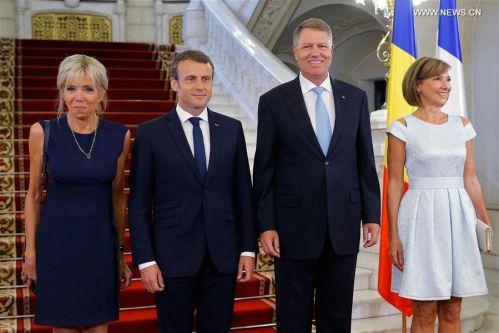
French President Emmanuel Macron (2nd L) and his wife Brigitte Macron (1st L), and Romanian President Klaus Iohannis (2nd R) and his wife Carmen Iohannis pose for photos during a welcome ceremony at Cotroceni Palace in Bucharest, Romania, on Aug. 24, 2017. Romanian President Klaus Iohannis stressed on Thursday that the current posted workers system of the European Union (EU) was not good enough and needed improvement. Iohannis made the statement at a joint press conference with his visiting French counterpart Emmanuel Macron who is touring Central and Eastern Europe to win support for a reform of European labor market rules.(Xinhua/Cristian Cristel)
BUCHAREST, Aug. 24 (Xinhua) -- Romanian President Klaus Iohannis stressed on Thursday that the current posted workers system of the European Union (EU) was not good enough and needed improvement.
Iohannis made the statement at a joint press conference with his visiting French counterpart Emmanuel Macron who is touring Central and Eastern Europe to win support for a reform of European labor market rules.
"It is inadmissible to see the discontent in Western Europe on the one hand -- over incoming workers -- and on the other hand, to have the desire of the people from the East to live better," said Iohannis, underlining that the system had produced such disagreements and divergences.
"The directive is not clear and good enough," the Romanian president said about the posted workers system.
According to Macron, the directive currently has a weak framework that allows companies to hire workers and pay them salaries from their country of origin.
"I cannot accept that French transporters do social dumping hiring workers from other European countries at lower costs," he said, stressing that revising the system was a must as it doesn't represent the European spirit.
Macron arrived in Bucharest on Thursday, after a meeting Wednesday with the heads of government from Austria, the Czech Republic and Slovakia in Salzburg. He heads to Sofia on Friday, the last stop of his tour.
The increased use of posting noted in some EU countries and cases of unfair competition and fraud detected led major Western European countries to advocate for reform.




 A single purchase
A single purchase









